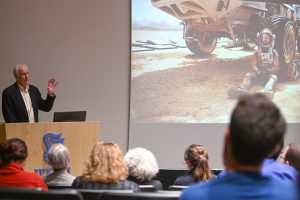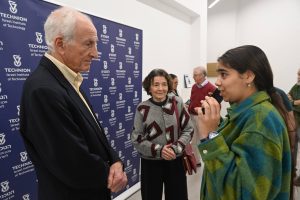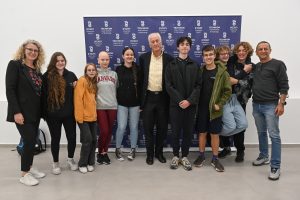Astronaut who saved Hubble Space Telescope back in the Technion
"Torah in Space" documentary premiere held at the Technion, in the presence of the star of the film, Astronaut Jeff Hoffman.
The Technion – Israel Institute of Technology recently hosted Professor Jeff Hoffman from the Massachusetts Institute of Technology (MIT), who talked about his journey to fulfill his childhood dream to become an astronaut. “As a child, my father bought us a telescope to watch the stars,” he said in his lecture, “and ever since, I was captivated by the magic of astrophysics.” A significant part of the lecture addressed NASA’s Mars landing mission and the project that Prof. Hoffman has been working on in recent years, MOXIE, which is a system for producing oxygen on Mars.
The system, which is the size of a small toaster, was placed on Mars to demonstrate the possibility of supplying oxygen to the humans arriving there in the future. In 2021, NASA reported the first production of oxygen from carbon dioxide on Mars using the MOXIE system installed on the Perseverance spacecraft. Last year, Prof. Hoffman reported on the success in producing oxygen in seven different experiments under different conditions and at an average rate of six grams per hour. His results were published in the journal Science Advances. At the Technion, Prof. Hoffman explained, “The rate of oxygen we’ve been able to produce so far on Mars is enough for a dog, but not yet for humans. Our goal is to produce three kilograms of oxygen per hour. Such a process consumes a lot of energy, which will probably come from a nuclear source in the future.”
Prof. Hoffman, born in 1944, earned a Ph.D. in astrophysics from Harvard University. He was one of 35 astronauts accepted by NASA out of 8,000 applicants in 1978. Since then, he has accumulated more than 1,200 space hours, during which he amassed 34.5 million kilometers of space travel.
Over the years, he participated in five space missions, including the repair of the Hubble Space Telescope, a mission that required him to specialize in space walking. In 2007, he was inducted into the American Astronaut Hall of Fame.
During his lecture at the Technion, Prof. Hoffman said: “Being an astronaut is the hardest profession in the world. That said, we astronauts are human beings, and when we go on a journey in space, we bring our history and culture with us. In the Jewish tradition that I grew up on, ‘Tikun Olam’ is of great importance, and I feel that the repair of the Hubble Space Telescope was my personal ‘Tikun Olam.’ It was the most significant thing I did in my life and is my biggest contribution to science and astrophysics. At that event, I was privileged to perform the first unplanned spacewalk in history.”
On his trip to space in 1993, which took place around Hanukkah, Hoffman brought with him a special dreidel that he spun in the spacecraft. Three years later, he brought a special Torah scroll into space and read its first verses in front of the cameras that broadcasted the event to Earth. Now, some seven years after his previous visit to the Technion as part of the events of the International Space University (ISU), Prof. Hoffman returned to the university for the premiere of the film Torah in Space, documenting the same journey that took place in 1996. The film was presented by Rachel Raz, who initiated and produced the film. Technion students, high school students, and faculty members took part in the festive screening. The event opened with a welcome by Prof. Adi Salzberg, Vice President for Diversity and Inclusion. After the event, Prof. Hoffman toured the Asher Institute for Space Research at the Technion and met with the head of the Institute, Prof. Yoram Rozen.





